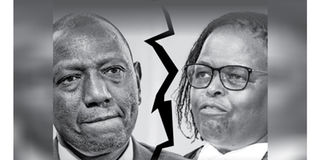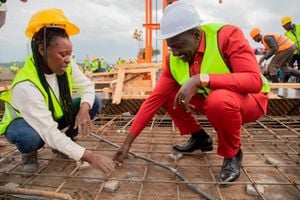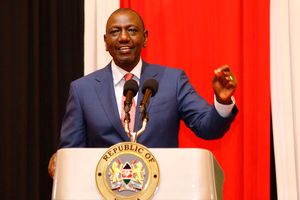
President William Ruto addresses congregants during a church service at AIC Sugutek in Soy constituency, Uasin Gishu County, on January 7.
Top government officials have been thrown into crisis mode and are mulling a fight back strategy that includes appeals and the parliamentary route to salvage some of President William Ruto's pet projects that have been halted by court decisions.
Attorney-General Justin Muturi and National Assembly Clerk Samuel Njoroge told the Sunday Nation that appeals on some of the key decisions were in the final phase of preparation before they are filed.
In recent months, President Ruto’s pet projects and plans; the housing levy, rollout of “Maisha Namba” new identity system, a planned healthcare system under the Social Health Insurance Fund (SHIF), the appointment of 50 Chief Administrative Secretaries, planned privatisation of 11 State firms as well as that of Mombasa and Lamu ports, and a planned deployment of 1,000 police officers to Haiti are some of the key programmes that have been stopped by the courts.
On Friday, the Head of State faced a triple blow; the collection of a levy to fund the housing programme was stopped; the planned deployment of police to Haiti was halted; and the High Court admitted a case challenging National Assembly Speaker Moses Wetang’ula’s ruling on which side has the majority, hence the upper hand in sharing of leadership seats and committee chairpersonships.
“The National Assembly has assured us that within one week, they will be done with that Affordable Housing Bill, we will comply with what the court wants. They will bring it to the Senate, and in a month, we will dispense with it so that our young people can go back to work,” Senate Majority Leader Aaron Cheruiyot said in Elgeyo Marakwet yesterday.
He added: “This affordable housing programme is a covenant that President Ruto entered between him and the people that voted for him and nobody should dare scuttle that project.”
Dr Ruto is said to have demanded water-tight appeals in various meetings with his advisors, in line with his public pronouncements on the insistence of the programmes continuing.
But for the President, his has been a case of a monumental crisis, getting worse with each ruling. There have been attempts to bypass already established legal precedents, especially on public participation, as well as laws.
On the housing levy, High Court judges David Majanja, Christine Meoli and Lawrence Mugambi last month said that imposing the fee against persons in formal employment and excluding non-formal income earners to support the national housing policy was without justification, unfair, discriminatory and irrational.
"Nonetheless, legal certainty is one of the hallmarks of the rule of law, good governance, transparency, and accountability. The amendment in the Employment Act does not set out either on its face or by reference to other legislation how the stated purpose is to be achieved,” the judges said.
The levy came into force following an amendment to the Employment Act through Finance Act, 2023.
On Friday, the Court of Appeal declined to extend an order allowing the government to continue collecting the housing levy.
The government had asked for a suspension of the judgment of the High Court that found the levy illegal as it targets a section of the population.
The President, who was in Meru when the news came in, said the plan will go on as planned.

President William Ruto and Chief Justice Martha Koome. Dr Ruto’s controversial comments interpreted as a vow to defy unfavourable court rulings has raised issues.
“I want to tell those that have gone to court that there is no greater public interest than to create jobs for our youth who have graduated from institutions yet they don’t have an income. They should know that we are on a mission to create equity in our country and they will not stop us. This is the first government that has a clear demonstrable plan on how to create employment,” President Ruto said.
Speaking at the same event, Majority Leader Kimani Ichung’wah said they will respect the decision of the courts but will put laws in place to ensure the housing levy continues.
But even the public participation Mr Ichung’wah speaks about is also a victim of another court order, which prohibited the beginning of hearings on the Bill that sought to cure the anomaly.
On the Haiti mission, Justice Chacha Mwita faulted the government for the plan to deploy 1,000 police officers on the strength of a National Security Council (NSC), saying the body chaired by the President had no such power, as the police are required to operate within the Kenyan territory under the law.
In trying to justify the deployment of the officers to Haiti, Parliament argued that Article 240 (8) (a) of the Constitution provided that the National Security Council with the approval of Parliament may deploy national forces of Kenya for regional or international peace, support operations or other support operations.
Parliament had pointed out that the National Police Service is one of the security organs under Article 239 of the Constitution hence the deployment of the officers is an isolated case as espoused in Article 240 (8).
“Section 108 (1) of the National police Service Act provides that the President may on the application of the government of a reciprocating country, order such number of police officers as the President may think fit to proceed to that country for service therein for the purpose of assisting the police service that country in a temporary emergency. The implication of this provision is that police can be deployed outside the territories of Kenya,” reads the report.
But the High Court said this was erroneous, as the police do not fall under the category of defence forces and, therefore, cannot be deployed to Haiti.
In his judgment, Justice Mwita ruled that the Constitution only allows members of the Kenya Defence Forces to be deployed outside Kenya for such missions.
As pointed out by Mathare MP Anthony Oluoch on the floor of the House, but ignored by members, the judge also said that there exists no reciprocal agreement signed between Kenya and Haiti hence it will be against the law to deploy police officers to Haiti.
A committee report indicated that only Homa Bay Town MP Peter Kaluma registered a dissenting opinion, saying as a national service, the National Police Service performs its functions within the territory of Kenya and is not a force for deployment outside except under section 108 (1) of the NPS Act where there is a reciprocal arrangement but was case on the Haiti mission.
Mr Kaluma also opposed the deployment terming it unconstitutional and unlawful under Article 240 (8) and article 243, 245 of the constitution and sections 24 and 27 of the National Police Service Act, 2011.
“The National Police Service is a service under the independent command of the Inspector General and is not a force capable of deployment by the National Security Council which is chaired by the President and the Commander in Chief of the Kenya Defence Forces,” Mr Kaluma said in the minority opinion.
The President is also not sitting pretty as the ruling by National Assembly Speaker Moses Wetang’ula has now been put to test after the High Court on Friday threw out a government application seeking to strike out a case on a determination on the majority side in Parliament.

President William Ruto inspecting the ongoing affordable housing project in Kibera Highrise, Langata Constituency in Nairobi on November 22, 2023.
“We are not persuaded this petition should be struck out on grounds it is in the category of disputes to be brought as ordinary suits or subjected to other bodies for determination,” the court ruled.
Mr Wetang’ula, in his ruling delivered in October 2022, following a fierce political dispute between Azimio and Kenya Kwanza stated that the latter has 179 Members of Parliament compared to 157 from their rivals in Azimio on the premise that 14 MPs’ political parties signed a post-election coalition agreement.
Azimio protested the move, accusing the Speaker of “forcefully” moving their members to Kenya Kwanza without any legal basis.
The move by the court is now likely to reignite another battle between the government and the opposition when the House resumes next month.
On the Chief Administrative Secretaries’ positions, which are widely meant to reward political rejects, the slots are in limbo after the court ruled that the creation of an increased number of CASs by President Ruto did not meet the constitutional threshold.
The judges pointed out that the public clamour for control of the size of the Executive was reflected in the Draft Constitution of Kenya 2004 by the Constitution of Kenya Review Commission.
Privatisation of parastatals
"Therefore, the creation of a similar office to the assistant minister, in the name of CASs, could not be created in the manner the President and the PSC proceeded," said the court.
At the same time, the ambitious plan by the government to privatise 11 parastatals has also hit a hurdle following a case filed in court by opposition leader Raila Odinga who argued that that the agencies are of strategic importance to the people of Kenya that can only be privatized with the consent of the people through a referendum.
Apart from KICC, other parastatals earmarked for privatization are Kenya Pipeline Company (KPC), New Kenya Cooperative Creameries (KCC), Kenya Literature Bureau (KLB), National Oil Corporation of Kenya (NOCK) and Kenya Seed Company Limited (KSC).
Others are Mwea Rice Mills Ltd , Western Kenya Rice Mills Ltd (WKRM), Numerical Machining Complex Limited (NMC), Kenya Vehicle Manufacturers Limited (KVM) and Moi University owned Rivatex East Africa Limited (REAL).
Another plan by the government on “Maisha Namba”, which seeks to replace the stalled “Huduma Namba”, introduced by President Uhuru Kenyatta’s administration and which more than Sh10 billion was spent on, has also been halted for lack of data protection impact assessment and meaningful public participation before the implementation.
Public participation is enshrined in Article 118 of the Constitution and one would expect the government to adhere to it as a basic requirement to be adhered to before implementing a project of such magnitude. The court stopped the rollout of the ‘Maisha Namba’, a unique personal identifier number assigned to the ‘Maisha Card’.













